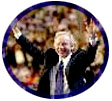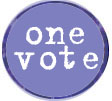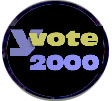|
The
Buzz: A first-time voter asks: "What's the Deal? NewsHour coverage of Election 2000 Outside
Links: The U.S. Federal Election Commission: Info about financing campaigns for federal office, the rules and regulations pertaining to this process, or elections and voting in general. Don't pass up your opportunity to have your say. If you're eighteen, make sure you're registered to vote. Click here for more information on voter registration.
|
Is
The System Broken? “The right of citizens of the
United States, who are eighteen years or older, to vote shall not be
denied or abridged...” "Can't be bothered to vote," says an 18-year-old. She's not alone. Voter turnout among 18-24 year-olds was only about one out of four young citizens in the last presidential election. Not only are young people not voting, they're not getting involved in politics either. They don't volunteer for campaigns and very few run for elected office.
Voter apathy is creeping up slowly. Some call it "political depression" and it begs the question: If people don't participate, at what point does a democracy cease to be democratic? Turned Off or Tuned Out Some of the reasons young people stay away from the polls match those of older non-voters, but some are unique to young people. There've been several major attitude shifts during the last three decades which affect voters of all ages, according to Curtis Gans, director of the Committee for the Study of the American Electorate. Among them, a sense that one's vote matters has declined. People are following the news less and thus are out of touch with politics and public affairs. Specific to young people, Gans suggests that there's a decline in the quality of education in urban America, particularly a decrease in civic activities by young people. But perhaps most of all, there's a sense that politics is dirty business. Some people assume moral and ethical individuals won't run because they can't stomach the compromises needed to raise the money and dodge the investigative reporters. There's also a perception that unless you're a wealthy, white male from a politically connected family, you might as well forget it. Just an Average Joe One U.S. Senator has been outspoken on this issue. In fact, he's written a book called: "In Praise of Public Life". Now he's got a real platform for his crusade. He's running for Vice President on the Democratic ticket with Al Gore.
"The Clinton-Lewinsky saga is the most vivid example we have of the virus of lost standards being passed back and forth among the entertainment culture, the news media and government, making each more ill," he writes. Gans agrees. He says shrinking political interest among young people is "a by-product of sensational politics." Service, Yes. Politics, No. Lieberman is also concerned because young people are staying out of politics. He says interns who serve in his office say very few of their classmates are interested in government careers because they view the political sphere as "nasty, expensive, too partisan and [a place where] you don't have any privacy." Those are "four
pretty good arguments," says Lieberman. "But not as many," he says, "are interested in going into government service, and certainly not elective service." Young people are frustrated with politics, but are not apathetic, says Gans. "The word apathy means that they have no interest, no emotion, no feelings, no voice on the issues," Gans said. "There is disgust and discouragement and frustration, but not apathy." The mistrust of government by the young, and the decline in voting among the population in general, signal "a low point in the American people's relationship with their government,. . . a real crisis of confidence, not just in politicians, but in the value of public life in our democracy," Lieberman says. Money, Money, Money
There are rules on the books to try to keep things fair-- loads of them. Since 1907, it's
been illegal for companies to spend money in connection with federal
elections. And since 1974, it's been illegal for an individual to contribute more than $1,000 to a federal candidate, or more than $20,000 per year to a political party, for the purpose of influencing a federal election. But individuals and groups have found ways around these rules. Soft money is money that is technically permissible but violates the intent of these rules. It's the donations by businesses, union contributions and the large-- $100,000, $250,000 or even $1 million-- contributions given by wealthy individuals to the political parties. This money is supposed to be used for "party building" purposes that are unrelated to influencing federal elections. But "party building" is not defined. Over the past few years, public interest in changing this system has swelled. Several types of campaign finance reform are now on the table. One set of reforms focuses on eliminating private money from campaigns. Candidates would run on public money (with each person getting the same amount). This would free politicians from spending time on fund raising and eliminate the influence that comes with donations. Some reforms aim to reduce spending on television broadcasts by providing the same amount of free air time to each candidate. The other set of
reforms aim to make sure candidates who accept private money list the
donors publicly. These reforms are aimed at eliminating "soft money". It includes limits on campaign spending by Senate candidates, free television time and reduced-cost mailings for candidates who abide by spending limits, tough new limits on political action committees (PACs), a ban on bundling, a practice used by PACs to evade campaign contribution limits, an end to the soft money system that allows huge unlimited contributions from wealthy individuals, corporations and others to be laundered through the political parties. Just Leave Us Alone So you've sold your soul to raise the money. Are you now willing to bare it to get elected? Today reporters go beyond reporting, and conduct investigations. Your opponent will probably do some digging too.
"The loss of respect for privacy has exacted a terrible price in American politics. When anyone who runs for president knows that intimate details of his or her life will be shouted to the world, what sensitive person would run?," writes New York Times columnist Anthony Lewis. "The way we choose our presidents is a national disgrace." White, Male, and Wealthy We've discussed money and privacy-- but what about race and gender? "No blacks,
no Latinos, no Asians, no "serious" women candidates."
That's how Los Angeles columnist Asadullah Samad describes this year's
presidential election choices. It's a real disappointment.
So why the failure to nominate minorities? "They'd rather take a chance on fronting off constituencies that 'might' vote than alienate sure constituencies that 'do' vote," says Samad. "Both parties are content with fronting off black America and other ethnic/gender constituencies with an all-white, all-male ticket, while they make their run to the middle, the heartland of America," says Samad, "And the heartland ain't ready for a black vice president." It's Important to Care O.K. There are problems. But what happens if no one "good" runs? Who ends up running? And what happens if people don't vote? "Bad officials are elected by good citizens who do not vote," said the American writer George Jean Nathan. It's a vicious cycle. Elected officials make the laws and are in the best position to bring about campaign finance reforms. Good, hard working elected officials are needed to turn things around. The advice of people like Lieberman: vote, get involved, run for office. "We need to convince more young people who want to make a difference that they should enter public life," Lieberman writes. "For the American experiment in self-government to remain vital, we need more people to serve in that government and to lead public lives." Lieberman was a teen once too, one with idealistic goals: "I went into public life, public service to try to make a difference, to improve the world."
Does he have any regrets? After nearly three decades in public office, and despite occasional moments of "frustration, even anger," he says, "I feel grateful that I made the career choice I did."
|







 Voter
turnout across all ages has been declining. The United States now has
on average the lowest voter turnout in the world (among mature democracies).
Voter
turnout across all ages has been declining. The United States now has
on average the lowest voter turnout in the world (among mature democracies).
 Joseph
"Joe" Lieberman thinks the source of cynicism is a three-headed
monster of government, media and the entertainment culture, all of which,
he says, appear to have hit all-time lows.
Joseph
"Joe" Lieberman thinks the source of cynicism is a three-headed
monster of government, media and the entertainment culture, all of which,
he says, appear to have hit all-time lows. The
cost of campaigning continues to skyrocket. Candidates must raise more
money then ever before. There's an old Hindu saying-- if you put your
hand in someone's pocket you have no choice but to walk alongside them.
That's another way of saying that donations often come with strings
attached.
The
cost of campaigning continues to skyrocket. Candidates must raise more
money then ever before. There's an old Hindu saying-- if you put your
hand in someone's pocket you have no choice but to walk alongside them.
That's another way of saying that donations often come with strings
attached. Some
say knowing the details of how a person conducts themselves in former
jobs, elected positions or personal life is important information for
voters. Others say these investigations go too far.
Some
say knowing the details of how a person conducts themselves in former
jobs, elected positions or personal life is important information for
voters. Others say these investigations go too far. Many
national political and civil rights leaders said in 1996 that it was
the last time they'd support an "all-white, all-male" presidential
ticket. Several national surveys have indicated that many Americans
say they would be ready for a black president by the year 2000.
Many
national political and civil rights leaders said in 1996 that it was
the last time they'd support an "all-white, all-male" presidential
ticket. Several national surveys have indicated that many Americans
say they would be ready for a black president by the year 2000. Now,
even he finds it amazing to think that he could be a heartbeat away
from the presidency.
Now,
even he finds it amazing to think that he could be a heartbeat away
from the presidency.